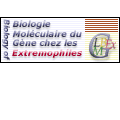
|
|















|
International Summer School
From Genome to Life:
Structural, Functional and Evolutionary approaches
|
OLIVER
Steve |
|
School of Biological Sciences, University of Manchester, 2.205 Stopford Building, Oxford Road, Manchester M13 9PT title: Doing integrative biology using yeast functional genomics Functional genomics represents a systematic approach to elucidating the function of novel genes revealed by complete genome sequences. Such a systematic approach should adopt a hierarchical strategy since this will both limit the number of experiments to be performed and permit a closer and closer approximation to the function of any given gene to be achieved. Moreover, hierarchical analyses have, in their early stages, tremendous integrative power and functional genomics aims at a comprehensive and integrative view of the workings of living cells. Saccharomyces cerevisiae was the first eukaryote for which a complete genome sequence was available, and yeast has been in the vanguard of the development of new concepts and technologies, both for the systematic analysis of gene function and to gain such an integrated view of cellular activity. We are developing both bioinformatic and experimental tools for the functional analysis of the Saccharomyces cerevisiae genome. The basic experimental approaches may be grouped into four domains: genome, transcriptome, proteome, and metabolome. The utility of genetic, biochemical, and physicochemical methods for the analysis of these domains will be discussed, and the importance of framing precise biological questions, when using these comprehensive analytical methods, will be emphasised. In order to gain new biological insights from functional genomics, it is essential to integrate the qualitatively distinct data accumulated from each of these domains of experimental analysis. A data-warehousing system that enables this will be described, and the results of such an integrative study in the evaluation of protein interaction data discussed. |